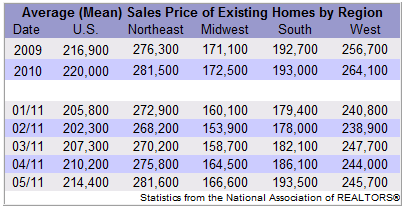Gearing up for a Housing Comeback
July 18, 2011
HARRY'S WEEKLY UPDATE
A CURRENT LOOK AT THE COLORADO SPRINGS RESIDENTIAL real estate MARKET
LOCAL SALES TAX COLLECTIONS UP FOR 20TH MONTH IN A ROW
Sales Tax collections are a good indicator of the state of a community's economy. Sales and use taxes fund more than half of the city's annual budget for police and fire protection, roads and other services.
The good news is that our local sales tax collections have gone up for the last 20 months in a row.
Categories that showed the largest increases in June were Hotels and Motels, up 15.04% from a year earlier, utilities, up 14.54% and grocery stores, up 8.61%. The four categories with decreases were furniture, appliances and electronics, auto dealers and building materials.
However, the sales tax from medical marijuana jumped 67.87% from a year earlier to a record $71,005 and total new record of $305,454 so far this year. That's a new high. (Pardon the pun).
Who says our economy is going to pot?
FREDDIE MAC SEES BETTER DAYS AHEAD IN HOUSING
Freddie Mac's chief economist is optimistic that the housing market and economy will improve in the second half of 2011.
Quoted in HousingWire, June 27, 2011, Freddie Mac Chief Economist Frank Nothaft said mortgage rates will likely remain historical lows of between 4.5 percent and 5 percent for the remainder of the year. Also, he expects more buyers to stop waiting on the sidelines as recent price drops in home prices have improved affordability.
Nothaft said consumers' uncertainty about the economy has caused them to delay home purchases and other "big-ticket items."
"Some potential buyers who have the means to buy are awaiting clearer signs that home values have firmed," Nothaft says.
But Nothaft says they should be getting their signs in the second half of the year, with projected job gains, and a growing, improved economy.
"Even though near-term concerns over income and sales growth are restraining consumer spending, business hiring, and new building, a number of positive signs in the economy indicate that growth will continue and is likely to accelerate in the second half of this year," Nothaft said. "Look for a gradual improvement in housing activity in the coming year."
Give us a call to discuss our local market and to explore the great opportunities for investment property in our current market at (719) 598-3200, or, 800 677-MOVE (6683).
GEARING UP FOR A HOUSING COMEBACK
Realtor magazine points out that no one knows for sure when residential real estate will officially "recover," but a turnaround may not be far off. When it comes, practitioners and brokers who spent the downturn fundamentally improving their business will be in the best position to take advantage of the upswing, a panel of real estate executives said at the recent REALTORS® Conference & Expo.
"We're in the seventh inning of a full-blown housing correction," said Ron Peltier, chair and CEO of HomeServices of America. "I think what's happening is that all of the nonsense is getting pushed out of the market. If we understand that, we can be better operators."
At this point, there are signs of improvement. For example, as Realogy President and CEO Alex Perriello pointed out, there has been a significant increase this year in home sales over $500,000 and in all-cash transactions. "We're seeing the value buyer getting back into the market; these are people who are well-off financially and very thoughtful. What that tells me is that the smart money is calling bottom," he said.
Peltier added that, for Realtors, deep knowledge of their local market is critical. But one thing the panel repeatedly emphasized was a commitment to helping out consumers, even when there isn't an immediate financial benefit.
"As REALTORS®, we can do a lot to help keep people in their homes. If you do a good job when people need you, those people will be your customers for life. That's your dividend."
Well said, guys. Those are our sentiments, exactly.
COLORADO SPRINGS NEW MAYOR UNVEILS NEW P.R. PUSH .AND IT'S GREAT
On June 30th, at the Colorado Springs Chamber lunch, we had the opportunity to see what our new mayor and city council have in mind for their push to attract new businesses to our city. .and it was impressive.
First of all, the website, www.springsgov.com, was very well designed, very attractive and very impressive. The link to Springs TV on Demand took us to a beautiful, four-minute video production, "The Spirit of the Springs". This video was developed by the Public Relations department of the City of Colorado Springs and is designed to make everyone aware of our great city, our magnificent attractions, our multiple activities and our unbeatable lifestyle.
If this video doesn't attract new visitors and businesses to our city, nothing will.
Some of the other various links on the website are:
- News (and, if the sheer number of news items on the site doesn't impress you, I'll eat my hat)
- Events (There's something to do every day in our city)
- "I Want To" with links to everything from applying for a building permit, checking airport flight information, obtaining a free prescription discount card, finding Fire Station locations, etc., etc., etc..
- Web Links (Check out Tourism and Attractions .Wow !!.New York City has nothing on us)
We strongly recommend that our readers click on www.springsgov.com to see how our new city administration is hitting the ground running, as they try to attract new visitors and businesses to our unique city. Send this link to your out-of-town friends and relatives and then stand back as the requests to visit you start coming in.
If this is an example of what our new administration is going to do to help build our economy, we can hardly wait to see what will happen next.
Nice going, Mayor Bach.!!!
As a matter of fact, the new Colorado Springs promotional film has us so excited about living here that we will take some time off, just to explore some of the local attractions that we found on the site and didn't even know about .This means that next week, there will be no Weekly Update from Harry Salzman. Sorry, but we'll see you again on August 1, 2011.
And, please remember, I would be honored to serve as your Broker for all of your residential real estate needs. I want to help you, my reader, make the most prudent and accurate Real Estate business decision.
Also if you know of anyone who desires to buy or sell local real estate, or, who is moving in or out of the Pikes Peak region, remember that, with over 39 years of providing relocation and Real Estate services to clients throughout the country, I am uniquely qualified to assist them with the relocation process, including buying and/or selling their homes on both ends of their move. Please allow me to implement my negotiating skills on your behalf.
Just click on the icon at the top of this email to listen to my latest podcast. ..And, if you would like to learn more about our Job Loss Protection Program, please contact us.
LATEST STATISTICS
Click here for the latest Sales and Listing statistics for the Pikes Peak area
JOKE OF THE WEEK
Considering the heatwave that is sweeping much of the country, we thought the following heat-related jokes might be appropriate:
Rumor has it that the Florida Marlins will be renamed the "Humidity" so that fans in Florida will be able to say, "It's not the Heat that's so bad, it's the Humidity."
The U.S. has only three hurricane warning centers - Coral Gables, FL, Guam, and Honolulu, HI (recently completed). All three have faced Category 4 hurricanes in the past month. Which only goes to show: If you build it, they will come!
I really don't understand why the federal government was so slow to send aid to the areas hit by Hurricane Andrew. After all, both Florida and Louisiana have oil.
It was so hot today I saw a robin picking earthworms out of the ground with a pair of tongs.
What happens when the smog lifts in California? UCLA.
How to predict weather in Seattle: If you can't see Mt. Ranier, it's raining. If you can see Mt. Ranier, it's about to rain.
An honest weatherman would say, "Today's forecast is bright and sunny with an 80% chance that I'm wrong."
First cave man to 2nd cave man: "I don't care what you say. We never had such unusual weather before they started using bows and arrows."
Nate: "Hey, what's the weather like out there?" Kate: "I don't know. I'll tell you when it clears."
It's a bit "muggy" in New York today.
There's a technical term for a sunny, warm day which follows two rainy days. It's called Monday.
A postcard home: The weather is here. Wish you were beautiful.
A Viking invader is trudging up the beach in the pouring rain. He sees an Englishman and says, "So this is England. What's it like?" The Englishman replies, "Well, if you like the weather, you'll love the food."
A weather forecaster took a job in another part of the country. When asked why he transferred he replied, "The weather didn't agree with me."










